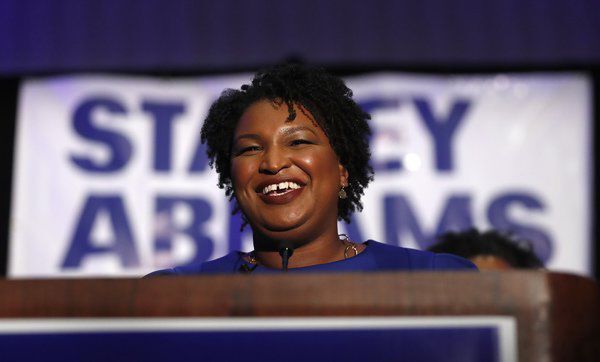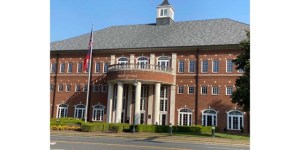Democrats may be gaining ground in Georgia
Published 4:00 pm Saturday, June 2, 2018

- AP Photo/John BazemoreDemocratic candidate for governor Stacey Abrams speaks during an election-night watch party May 22 in Atlanta.
ATLANTA — The recent state primary contest brought a swell of Democrats to the polls and significantly narrowed the gap between the number of Republican and Democratic ballots cast in Georgia.
This new energy among Democrats — manifesting with a 69 percent increase in turnout over four years ago — has left those on the left buoyed about their chances of reclaiming the governor’s mansion. Georgia hasn’t elected a Democrat for governor in two decades.
Trending
“It’s going to be a real big showdown in November,” said state Rep. Dexter Sharper, D-Valdosta, who backed former House Minority Leader Stacey Abrams in the primary. “History could possibly be made, for sure.”
Abrams’ blowout win already made her the first woman nominated for governor by a major party in Georgia. If she succeeds this fall, she will become the first black female governor elected in the country.
The Atlanta attorney will face either Lt. Gov. Casey Cagle or Secretary of State Brian Kemp in November, depending on which Republican candidate emerges from the July 24 runoff election.
If the primary election results are any indication, the November matchup could be a competitive one.
All said, only about 52,000 more Republican ballots were cast in the primary. Compare that to the nearly 277,000-ballot gulf that separated Republicans and Democrats in the contested U.S. Senate primary races that topped ballots in 2014.
And that’s with a slight uptick — just under 2 percent — in Republican turnout from four years ago in the gubernatorial race. Compared to the 2010 primary, though, about 11 percent fewer Republicans voted last month.
Trending
But Kenneth Ellinger, a political scientist at Dalton State College, called any talk of a so-called blue wave crashing ashore in Georgia as being “overly optimistic.”
“I would call it a blue trend. The Democrats are trending,” Ellinger said. “There’s still a pretty hefty gap between trending and winning — especially when you’ve been as far out in the wilderness as Democrats have been, really, for the last 16 years in statewide races. We’ve been a virtual one-party state.
“If Democrats were even within shouting distance in one race, it would be progress — where there was a reason to stay up past midnight (on election night) because it wasn’t already clinched,” Ellinger added. “Democrats haven’t had a reason to stay up past midnight in a couple of decades.”
Rep. Rick Williams, R-Milledgeville, who has endorsed Kemp, said he thinks the glut of options may have tempered enthusiasm among conservatives. Five Republicans ran for governor.
“There were so many people in the Republican gubernatorial race and I think it turned some people off, that maybe they just couldn’t figure out who to get behind,” Williams said.
If it continues, muted Republican turnout would help pave the way for a Democratic upset this fall.
But it’s only one of several factors that would have to go Abrams’ way in a partisan climate that favors Republicans in Georgia, especially in midterm elections, says Trey Hood, a political science professor at the University of Georgia, who conducted earlier polling on the gubernatorial race.
It would also take a jump in Democratic turnout in the fall. And the Republican nominee would also likely have to prove flawed in some way, further dampening enthusiasm on the right.
In other words, it would likely take a perfect storm, Hood said — something akin to the unusual situation that helped Democrat Doug Jones narrowly win a statewide race in Alabama and become a U.S. senator. In that race, allegations of sexual misconduct with young girls tanked Republican Roy Moore’s campaign.
“Can a Democrat win statewide office in Georgia? That’s what people ask me all the time,” Hood said. “The answer is ‘yes’ but it would have to be under certain circumstances. And if anything else happened beside these extraordinary circumstances, the answer is probably ‘no.’”
Hood said the back-of-the-envelope math just doesn’t work in Abrams’ favor. She would have to win 95 percent of the black vote, as well as 36 percent of the white vote. The trouble is only 24 percent of white Georgians identify as a Democrat, according to a January poll conducted by Hood.
The Abrams campaign says it is exploring “multiple pathways” for the Democrat to win in the general election, according to her campaign manager, Lauren Groh-Wargo.
“There is not one number we’re shooting for in any particular community,” Groh-Wargo said in a call with reporters Thursday, adding that the campaign would continue to work on driving up Democratic turnout.
An internal poll released last week, which was funded by the Abrams campaign, showed Abrams beating Cagle by five percentage points. That same survey put her over Kemp by nine points.
About 54 percent of respondents said they preferred a gubernatorial candidate who is “focused on building a diverse economy with good-paying jobs and expanding opportunities for families to thrive.”
On the other hand, 36 percent of those surveyed said they favored a focus on “cracking down on illegal immigrants, protecting Georgia values like the right to bear arms, and cutting government waste.”
The most recent external polling dates back to mid-May, when a survey from 11Alive News/SurveyUSA showed Cagle beating Abrams by five points in a head-to-head matchup.
Jill Nolin covers the Georgia Statehouse for CNHI’s newspapers and websites.





